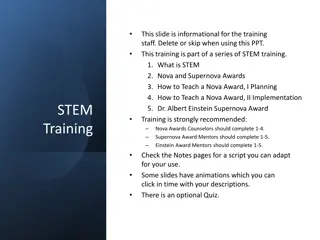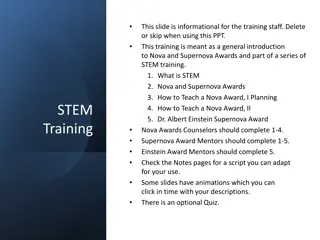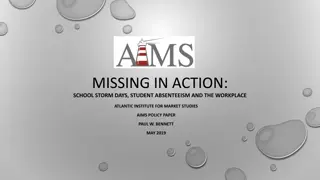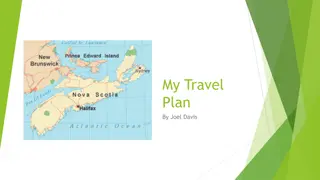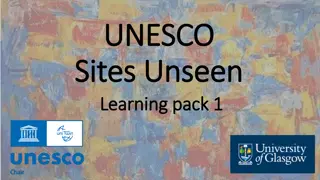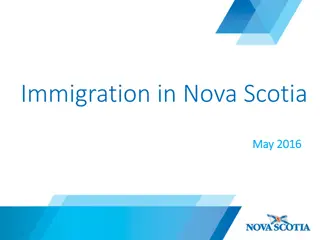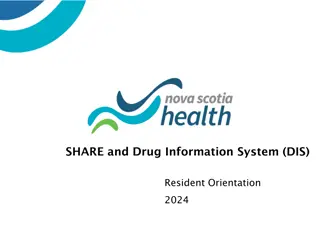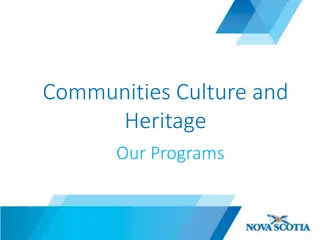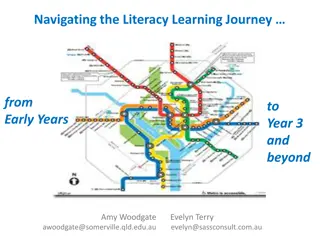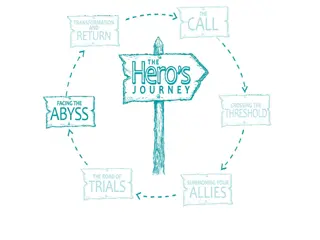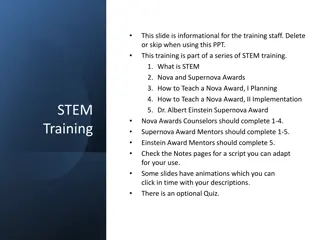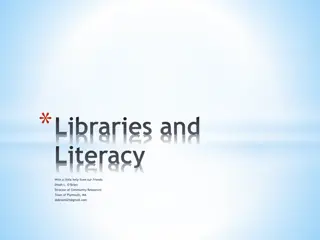Enhancing Literacy and Skills Development for Adults in Nova Scotia
L'quipe d'alphabtisation-Nouvelle-cosse focuses on offering French language programs to adults and families in Nova Scotia. Initially concentrating on community-based adult programs, they expanded to include family literacy initiatives and employment-focused programming in alignment with government objectives. Recognizing the need to bridge the gap between low literacy skills and job requirements, they adopted an integrated model approach. This approach was introduced after a chance encounter with Donald Lurette, leading to a more cohesive and effective skills development strategy.
Download Presentation

Please find below an Image/Link to download the presentation.
The content on the website is provided AS IS for your information and personal use only. It may not be sold, licensed, or shared on other websites without obtaining consent from the author.If you encounter any issues during the download, it is possible that the publisher has removed the file from their server.
You are allowed to download the files provided on this website for personal or commercial use, subject to the condition that they are used lawfully. All files are the property of their respective owners.
The content on the website is provided AS IS for your information and personal use only. It may not be sold, licensed, or shared on other websites without obtaining consent from the author.
E N D
Presentation Transcript
An Integrated Model To Support Skills/Competencies Development Professional Development Conference for Practitioners April 10 - 11, 2014 Holiday Inn Hotel & Conference Centre Truro, NS
Lquipe dalphabtisation- Nouvelle-Ecosse L quipe d alphab tisation-Nouvelle- cosse is a provincial non-profit literacy organisation offering French first language programs to adults and families throughout the province.
Adult programs Traditionally l quipe offered only community based programming to Francophone adults wishing to upgrade their French reading, writing and communication skills.
Family Literacy In 2004, l quipe received Federal Funds through the National Literacy Secretariat now Office of Literacy and Essential Skills to develop family literacy programming in an effort to promote literacy within Francophone families. Over the next 10 years, l quipe developed a variety of family literacy programs and reach approx. 250 people every year in up to 15 areas of the province.
LMA and Jobs Here Strategy As the provincial government s focus shifted towards employment we also began our journey towards developing programming to answer to the objectives of the government as well as the needs of adults with barriers to employment.
Our starting point There were considerable discrepancies between the need for adults with low literacy skills to find a job and the services offered by other programs. The training prioritized by these programs was more linear and academic, and was not really oriented toward the rapid acquisition of skills appropriate for the local jobs.
A Chance Encounter In 2009, while attending the AGM for R seau pour le d velopement de l alphab tisme et les comp tences (RESDAC), Donald Lurette, androgogical consultant and former literacy program facilitator, presented a brief overview of the integrated model approach.
Integrated training programs They are for a predetermined amount of time; They lead quickly to employment; They often include one or several forms of certification or recognition; The literacy training component provides for educational support all along the pathway to specialized training. Their participation costs are minimal; They take into account the main structural and psycho- social barriers that can affect the participation and learning of a clientele with low literacy skills;
Benefits of the integrated training programs Benefit from the many educational resources of different partners; Receive instructional and logistical support adapted to the learning obstacles they face and their complex needs; Receive an education that is adapted to their level of literacy and relevant to their needs for socio-economic insertion; Obtain formal certification or recognition for their learning; Participate in a preparatory process with a view to integrating the labour market or another project important to them; and, Promotes participation in various aspects of community life.
RESDAC 2011 RESDAC adopts integrated model as best practice for competency development for Level 1 and 2 adults with barriers to employment. RESDAC project includes NS (support-Donald, Inquire, Research and Evaluation)
The components of an integrated training program
Creating Partnerships Phase 1 (March 2012)
Partners Universit -Sainte-Anne (Tusket campus), Municipality of Argyle, Conseil acadien de Par-en-Bas, Conseil de d veloppement conomique de la N.- . (CDENE), Argyle Employment Services, West Nova Inclusive employment society, Department of Labour and Adavanced Education DCS
Environmental Scan Phase 1 (March 2012 June 2012)
Research And Data Collection Interviews with 28 local employers Open ended questions Focus Group
Which skills are necessary for the positions within your business/organisation? Good interpersonal skills / Teamwork Communication (in both languages) oral, written and reading Basic math skills Willing to learn new things Good work ethic Good customer service skills Respectful of others
Required skills within the workplace soft skills 55.26% essentiel skills 35.53% Comp tences t chniques 9,21% L quipe d'alphab tisation- Nouvelle- cosse
Upon hiring, what are you looking for in an employee? Teamwork Good communication Good presentation Honesty Self confidence Motivation (asks questions to help move things along)
Skills required to gain employment Soft skills 70.87% Essentiel Skills 18.99 Technical Skills 10.13%
Soft Skills Identified By Employers 90 80 70 60 50 40 30 20 10 0 Interpersonal skills 85.71% Positive attitude at work 78.57% Works Independly 60.71% Open to learning new things 35.71 % Good customer service 28,57%
Essential Skills Identified by Employers 50 45 40 35 30 25 20 15 10 5 0 Reading 46.43% Reasonning 35.71% Math 39,29% Computer Skills 25.0% L quipe d'alphab tisation- Nouvelle- cosse
A Model Employee Soft Skills 66.67% Essentiel Skills 19.05% Technical Skills 14.29% L quipe d'alphab tisation- Nouvelle- cosse
A Model Employee Soft Skills vs Essential Skills 100 90 80 70 60 50 40 30 30 25 20 20 15 10 10 0 5 0 Reasoning / follow directions 25% written and oral communication 14.29% team work 10.71%
Bilingual Customer service representative
Curriculum Development Phase 2 (January 2013 June 2013)
What skills /competencies to develop? In order to achieve a strong and lasting connection to the workforce, people need three complimentary skill sets. Futureworx
The Skills Pyramid Technical skills are skills specific to a given job. For example: Giving a bed bath Driving a bulldozer Futureworx
The Skills Pyramid Thinking Skills Continuous Learning Oral Communication Thinking Skills Reading Writing Numeracy Document Use Computer Skills Futureworx
The Skills Pyramid Also called soft skills or personal management skills. These are the foundation upon which all skills are built. Futureworx
Fundamental Question What role do essential skills, generic skills, second-language skills or specialized skills play in meeting the integration needs of the targeted clientele?
In the context of doing a task, these diverse skills must fit together seamlessly: sometimes one completes the other and sometimes one supports the other, either in the learning process or in action (carrying out a task).
The customer service program will promote: The basic skills of excellent customer service Professional communication techniques Software and digital technology necessary in the customer service field Excellent employability skills and attributes
The curriculum framework Personal Development - compulsory Introduction to Customer Service - compulsory Basic Computer Skills and Digital Technology compulsory Work placement compulsory 1STAid and CPR optional Occupational Health and Safety-optional Foodsafe level 1 optional WHMIS optional Mental Health First Aid - optional
Personal Development The Professional Development course will give the students the opportunity to gain insight into themselves as well as others. This knowledge will help them develop the necessary employability/generic skills to successfully gain and retain employment in the customer service field.
PD Modules Employability Skills Assessment Tool- (In depth development of 9 employability Skills: Motivation, attitude, accountability, time management, stress management, presentation, teamwork, adaptability and confidence) ABC s of Physical Appearance Mental Health 1stAid Nutrition Stress Management Portfolio Personality Dimensions Simulated Work Environment Projects Public Speaking
Customer Service This course will offer students a variety of modules that will familiarize them with the best practices relating to excellent customer service, in person, on the phone and by e-mail. The goal is to understand the basic principles of customer service as well as its importance in the overall satisfaction of the customer.
Customer Service modules The Importance of Customer Service Receiving Clients Professional Communication Techniques Billing (math skills relating to customer service tasks) Unhappy Customers How To Be A Successful Salesperson Forms
Basic Computer Skills and Digital Technology Computer skills have become essential in today s workplace. Our students will be introduced to a variety of basic notions, software and digital technologies in order to develop the computer skills necessary to succeed in the customer service field.
Technology Modules Word Digital Technology Excel Internet E-mail Responsible use of social media Information research
Our EvaluationToolbox Camera (Communication and Math Employment readiness Assessment) - Intake Esat - (Employabity Skills Assement Tool) Competency Assessment
CAMERA http://www.ptp.ca/wp- content/uploads/2009/01/camera-e-booklet.pdf
ESAT Generic or employability skills are evaluated using the ESAT tool developed by Futureworx Work Centre, Truro.
Employability skill development gets less emphasis. Why? Futureworx
Our experience : Lack of a common framework and language Seen as abstract concepts Belief they are acquired by osmosis Often involve sensitive issues and potentially conflict Hard to manage: Lacking tools for assessment or tracking progress Takes time to facilitate change Requires specific orientation and training in staff Futureworx
Ensure employability skills are a focus by: Providing a clear framework of employability skill definitions and expectations Creating an environment in which action on employability skills is seen as an obligation Providing tools to support action and assessment in a respectful, consistent manner Providing training to help people understand the tools and the methods.
Competency Assessment The success of the participants will be evaluated by their ability to complete specific tasks associated to the customer service field. (Ex. Writing a receipt, answering the phone and placing a client on hold, sending and receiving e-mail ).
Participant Recrutement DCS Universit Sainte-Anne CRC s WNIES Community forums School boards Women s centres/groups Adult Learning Centres





